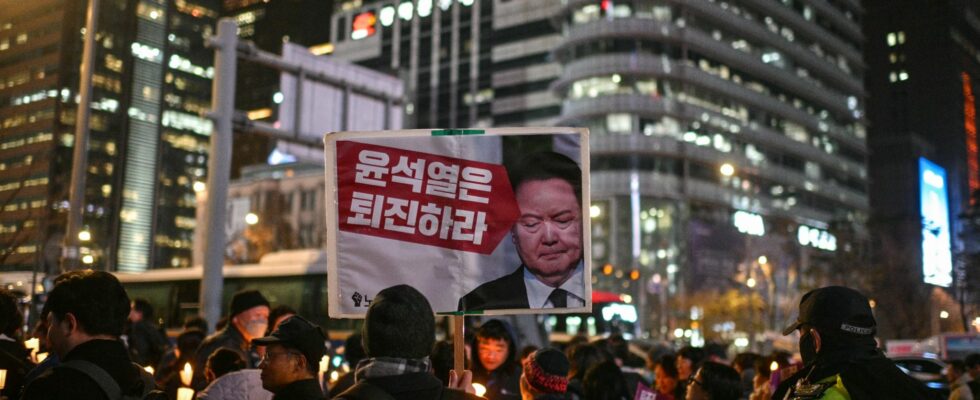South Korean President Yoon Suk-yeol, threatened with dismissal on Saturday for his failed attempt to impose martial law, was dropped on Friday, December 6 by his own party which judged that he posed “great danger” to the country and advocated its “rapid suspension”. Han Dong-hoon, the leader of the People’s Power Party (PPP) to which Yoon Suk-yeol belongs, reconsidered his position, after having affirmed the day before that his party would defeat the impeachment motion filed by the opposition in Parliament .
If Yoon Suk-yeol remains in his post, “there is a significant risk that extreme actions similar to the declaration of martial law will be repeated, which could put the Republic of Korea and its citizens in great danger,” he said. -he declared during a televised speech. Han Dong-hoon also said he had “evidence” that the president had ordered the arrest of political leaders on the night of Tuesday to Wednesday, when he declared martial law and sent the army to seal off Parliament, before give it up under pressure from deputies and the street.
According to opposition lawmaker Jo Seung-lae, footage from Parliament’s surveillance cameras indicates that the military sought to arrest the leader of the Democratic Party (the main opposition force), Lee Jae-myung, the president of the National Assembly, Woo Won-shik, and even Han Dong-hoon. Yoon Suk-yeol’s office assured that the latter had “not given the order to arrest or detain members of the National Assembly”, according to the Yonhap agency.
“No need to worry”
“We are receiving many reports of a second martial law. Until the impeachment law is voted on on Saturday, all members of the Democratic Party will remain in the main National Assembly building,” said lawmaker Jo Seung-lae. “There is no second martial law,” a general staff official assured AFP. The South Koreans “don’t need to worry,” added a Defense Ministry spokesperson.
If Yoon Suk-yeol does not resign before then, the South Korean unicameral Parliament will meet on Saturday at 7:00 p.m. (11:00 a.m. French time) to decide on his dismissal. A two-thirds majority of 300 deputies is needed to oust him from power. The PPP has 108 seats, compared to 192 for the opposition. The latter must therefore obtain the defection of at least eight deputies from the presidential party to pass their motion, which seems likely after the latest statements by the leader of the PPP. “Even if some members of the ruling party still support Yoon Suk-yeol, Han’s statements today seem influenced by the seriousness of the situation,” Shin Yul, professor of political science at the university, told AFP. from Myongji. “It appears that Han and party leaders have concluded that there is a significant possibility that President Yoon will declare a second martial law,” the researcher added.
If the motion is approved, Yoon Suk-yeol will be suspended from office pending validation of his dismissal by the Constitutional Court. If the judges give the green light, a new presidential election will take place within 60 days. The interim would then be taken over by Prime Minister Han Duck-soo.
Low popularity and daily protests
Yoon Suk-yeol, who has disappeared from the public scene since Wednesday morning, is also the target of an investigation for “rebellion”. According to several local media, the head of the presidential party met him on Friday. Yoon Suk-yeol’s approval rating has reached a low of 13%, according to a Gallup poll released Friday.
To everyone’s surprise, the president declared martial law Tuesday evening and tried to muzzle Parliament, where his camp is in the minority, by sending the army there. Yoon Suk-yeol, narrowly elected in 2022, accused opposition elected officials of blocking “all budgets essential to the primary functions of the nation”. He justified his coup by the need to protect “liberal South Korea from the threats of North Korean communist forces and to eliminate elements hostile to the state.”
Despite the closure of the Assembly, 190 deputies managed to sneak inside in the night, sometimes by climbing the fences, and unanimously vote on a motion calling for the lifting of martial law, while their assistants prevented the soldiers to enter the hemicycle by barricading the doors with furniture. The head of the special forces, Kwak Jong-geun, claimed Friday to have received an order from the former defense minister “to drag out the members of the National Assembly.”
Defying martial law, thousands of demonstrators gathered in front of Parliament to demand the president’s departure. The latter finally gave in six hours after his initial announcement and sent the army back to its barracks. Since then, thousands of South Koreans have demonstrated every day in front of places of power to demand his departure.
Friday, on the occasion of their first call after Yoon Suk-yeol’s coup, American Secretary of State Antony Blinken expressed to his South Korean counterpart his “confidence in the democratic resilience” of the South Korea, reaffirming “the unwavering commitment of the United States to our alliance”, according to its spokesperson.
